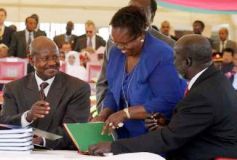Uganda eyes Sudan for business
By Elias Biryabarema
KAMPALA, Feb 8, 2005 (The Monitor) — Ugandan businesses want to cash in on the vast economic opportunities emerging in southern Sudan with the peaceful end to the 30-year civil war.

|
|
Uganda president Yoweri Museveni and Chairman of the IGAD Summit of Heads of States (L) and Sudan People’s Liberation Movement (SPLA) leader John Garang (R) share a joke during the signing of the Comprehensive Peace Agreement between the SPLA and the Sudan Government in Kenya’s capital Nairobi, Januray 9, 2005. (Reuters). |
The restoration of peace and opening up of the vast region, according Ugandan business executives, promises a huge virgin market, whose exploitation could boost Uganda’s economy and entrench our commercial ties in the region.
A delegation of Ugandan manufactures under the coordination of the Uganda Investment Authority (UIA) made a trip to Khartoum in December last year, primarily to assess the region’s potential and to explore how to penetrate the region’s economy.
UIA’s Executive Director, Dr Maggie Kigozi, told The Monitor recently, that the delegation, which consisted of the country’s premier manufacturers-Mukwano, Casements, CrestTanks and coffee producers- found lucrative prospects and is due to travel to Juba, southern Sudan’s capital in April to make some deals.
She noted that southern Sudan, semi arid and vulnerable to water shortages, would find plastic tanks handy for storing clean water.
“That’s a great opportunity for CrestTanks Ltd and similar situations exists for hundreds of businesses,” she said.
Ugandan Robusta Coffee is already a favoured brand in the region, an area where the onset of peace and economic stability could potentially treble exports. The most eyed item though, which Uganda sorely needs, is oil in the Sudan.
According to the agreement that guaranteed southern Sudan, a semi autonomous government led by SPLA leader Dr John Garang (also first Vice President of Sudan), all oil wealth will be shared by the south and north. Uganda, which has had a steadfast alliance with Garang and his SPLA could benefit from an oil bonanza there.
Kigozi said the Ugandan petroleum industry must get ready for deals on pipeline construction, petroleum refinery, transportation, retail and related business.
However, the two governments must invest in infrastructure to connect the two countries. Road and rail connection from Northern Uganda to Juba, she said, would cut the distance and the costs, significantly boosting potential profits.
Kogozi discounted fears that Kenya manufacturers might squeeze Ugandan businesses in southern Sudan on account of Kenya’s superior economy and its ability to venture more vigorously in emerging markets.
“We are closer to southern Sudan than Kenya and we already have stronger ties than Kenya, all of which favours us,” Kigozi said.
The southern Sudan market holds out enormous potential, not just for its sizeable population but also the billions of dollars in aid Western governments have pledged as part of reconstruction.
